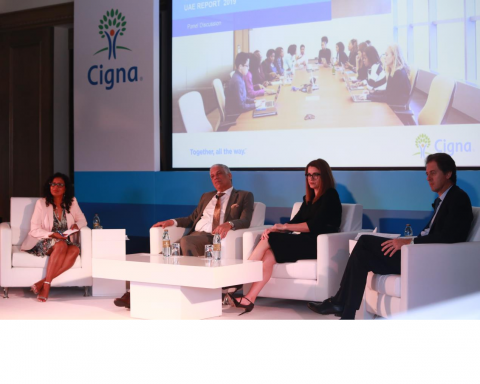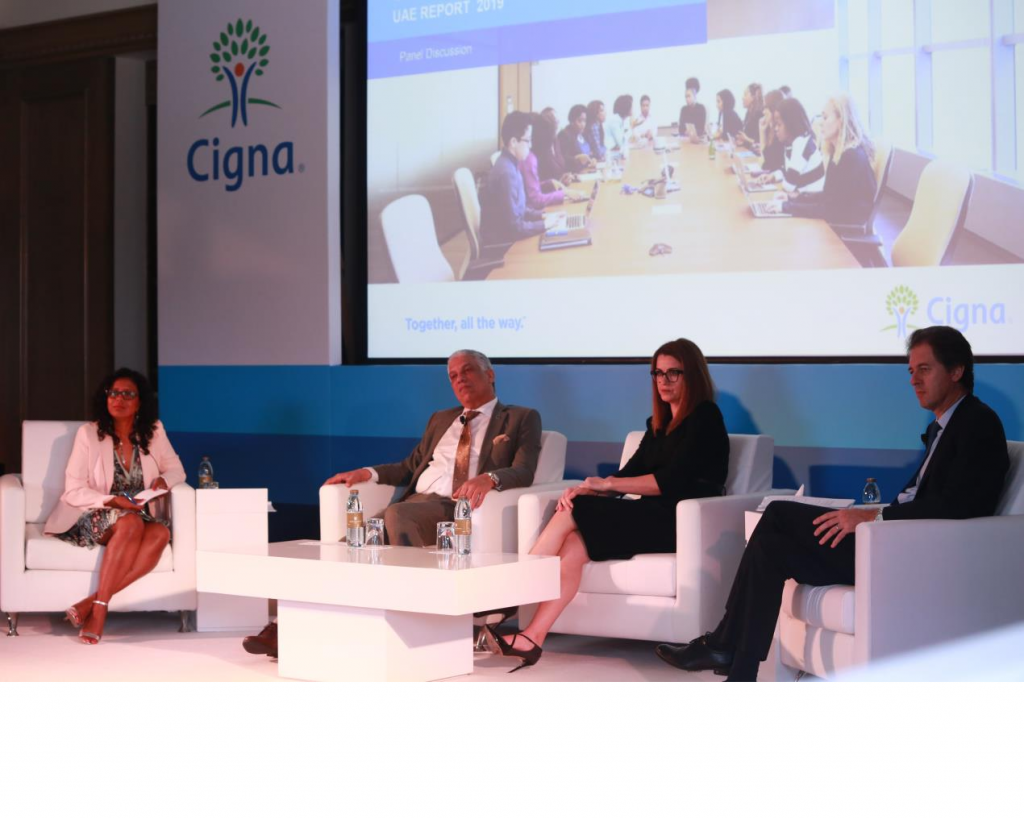
Global health service company Cigna Corporation (NYSE:CI) today released the results of its annual 2019 Cigna 360 Well-Being Survey - Well and Beyond that indicates an improvement in the overall health and well-being index of the UAE population by 1.4 points over 2018.
Ranking above the global average in sixth place with an overall score of 62.9 points, the country shows a strong outlook across five key indices – physical, family, social, financial and work.
Heart health has emerged as a key area of concern, identifying a gap in the perception of high blood pressure (HBP) – a pressing concern given its soaring prevalence in the region. The survey reveals that 32 percent of the residents believe that HBP is not curable with lifestyle change.
Reinforcing 2018’s findings, the survey points to high levels of stress among the UAE population. Despite an improvement in the overall score when it comes to fighting stress, close to 22 percent of residents still face unmanageable levels of stress.
The latest edition of the annual Cigna 360° Well-Being Survey was released at a launch event that drew the participation of Dr Saleh Al Hashimi, Advisor to the Dubai Health Insurance Corporation (DHIC) of the Dubai Health Authority (DHA), Dr Mohamed Farghaly, Consultant at DHIC and Head of Insurance Policies and Health Economics at DHA, and Gail Stanley, Head of Organisational Effectiveness at Noor Bank PJSC. Also present were Cigna representatives and leading medical experts from the region.
A panel discussion during the event examined the results of the survey that delves deep into people’s perceptions of health and well-being. Given its scope and scale, the 2019 edition is considered Cigna’s most comprehensive survey to date.
Heart Health Education
According to the survey, UAE residents are moderately aware of heart health indicators, such as Body Mass Index (BMI) and blood pressure, on a par with the global average. Conversely, their awareness of symptoms that may suggest potential heart problems is lower than the world average. More millennials than older age groups have admitted to experiencing these symptoms, despite the latter demonstrating higher awareness in this regard.
“In the UAE, 30 percent of respondents are battling HBP, a possible precursor to heart disease, yet close to half of them do not perceive this as fatal. Many are unaware that sometimes there are no symptoms ahead of a cardiac arrest. While some people know that a few key lifestyle changes can have a positive impact on blood pressure numbers and consequently improve heart health, many prefer not to take action, whether through ignoring the symptoms or not initiating any changes,” said Dr Mohamed Farghaly.
“Surprisingly, one in three respondents does not believe that HBP is curable with lifestyle change. Only 28 percent of respondents use wearable technology to track heart health. Heart health education is more important than ever, which is why Cigna has been driving the cause through its initiative ‘Heart Your Heart’ in the UAE,” said Jerome Droesch, CEO of Cigna MENA.

Workplace Stress and Job Stability
While the social, family and finance indices show improvement, these come at the expense of the physical and work aspects. Respondents consider lack of sleep and poor eating habits as key challenges, and while regular exercise scores remain steady since 2018, they mark a big drop from 2017.
From the financial perspective, UAE residents feel optimistic, less worried about retirement and secure about their finances even if they should lose their jobs. They also admit to being more satisfied with their salary, work compensation and benefits.
However, most express concerns about working longer hours and work-related relationships, with 91 percent reporting stress at work and 96 percent perceiving a negative impact of colleagues’ stress on the workplace. Stress drivers include personal and family finance concerns as well as overwork.
Few in UAE Have Tried Professional Help for Stress
Among those under stress, only six percent have spoken to a medical professional regarding the issue. However, more than half of those who sought professional help found it very effective in managing their stress.
“Companies in the UAE must study key gaps in employer support and concentrate on these in order to lower stress levels,” Jerome said. “Flexible work arrangements, special paid leaves, time off for personal interests and job security are just some of the benefits respondents feel employers should provide.”
Addressing the panel on the subject, Gail Stanley said: “I firmly believe it is the responsibility of employers to develop guidelines and support mechanisms to assist their employees in dealing with work-related pressures.”
“An important part of making this happen is to shape an environment where employees feel free to talk about anxiety in the workplace, rather than see it as taboo. Encouraging employees to adopt healthy habits that support positive mental health, such as exercise and a balanced, nutritious diet, as well as helping them prioritize and organize their work efficiently allows for better work-life balance,” she added.
At work, 43 percent of the surveyed claim their companies have a formal workplace wellness program in place, with a high participation rate of 69 percent. However, more than half of them think that workplace wellness programs are committed only to physical wellness and fail to give mental well-being the attention it deserves.
Women Ask for More Stress Support
Women in the UAE are more stressed than men, citing financial vulnerability, lower job security, less time to socialize and pursue hobbies, and concerns about their parents’ financial needs as key triggers of stress.
In some ways, they believe they fare better than men, especially with regard to working hours, work-life balance, career trajectory, and opportunities for growth and development.
In terms of employer support, women have articulated the need for job security, flexible working hours and relaxation rooms to take a break.
Interestingly, the findings of the 2019 Cigna 360° Well-Being Survey – Well and Beyond also reveal that women can rely on fewer workplace wellness programs to support their well-being than men. Only 35 percent of female respondents have a formal wellness program at work, as opposed to 46 percent of working men. Moreover, women believe their workplace wellness programs need to better address the specific requirements of each gender.
Cigna’s theme for 2019 is Well and Beyond, a call to make holistic wellness a priority. The company is keen to empower people on their wellness journey to take control of their well-being needs and equip them with the necessary tools to increase their awareness of health matters. To read the full report, please visit 2019 Cigna 360° Well-Being Survey – Well and Beyond.
Categories
- Log in to post comments